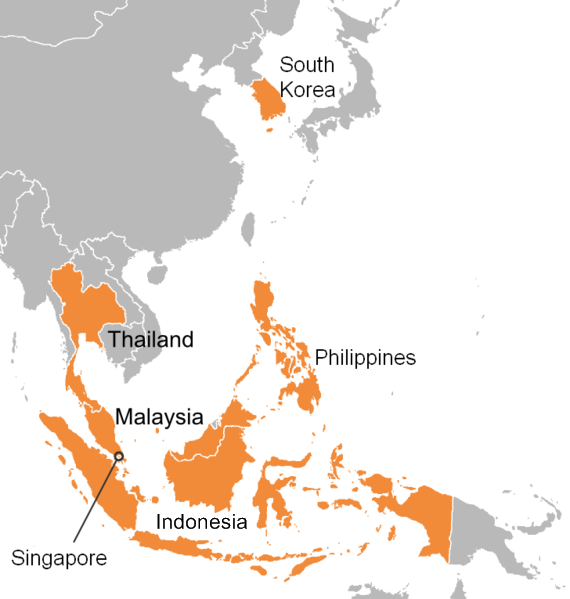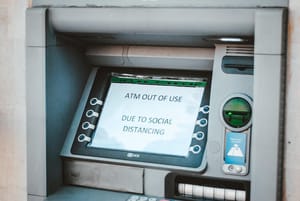Last week, I was invited to give a talk at a friend’s company, and I decided to speak about career moats.
One of the more interesting things to have come out of that experience was a story I told at the end of the talk, about my personal motivations for pursuing moats. I’ve not written about this before, and I don’t think I’ve ever properly introspected about my underlying motivations until I told the story.
This is a short post to capture some of that thinking. This is a pretty personal piece, so it was a little painful to write; I'll start by laying out my experiences, and then I'll reflect a little on job security, layoffs, and recessions in our world today.
Scar Tissue from 97
Looking back, my obsession with career moats probably started with the 1997 Asian financial crisis.

I was nine years old at the time. My dad got laid off; the company he worked for shut down operations in my hometown. I think my parents were really stressed. They fought a lot. I got into trouble in school, my grades tanked, and I recall being yelled at over the smallest things.
This marked the beginning of a lean period where my dad struggled to make ends meet. We sold my childhood home a few years after the crisis. My memory is fuzzy here; I think my dad had a go at business consulting, tried his hand as owner of a car workshop, and joined an MLM-company with my mom. None of those gigs panned out. It was a number of years later that he got a stable job — one that he excelled at — which he worked till his retirement.
This experience left an indelible mark on me. I remember thinking to myself: I never want to be in a similar position in my career. But how was I supposed to do that?
So I started by looking around.
The most successful people in my hometown were businessmen. I've written before about the cultural meme of the ‘Chinese Businessman’, and how prominently it featured in the Chinese identity in Malaysia and Singapore. And so my initial thought was that if I owned a business, I could never be fired. This idea was naive, of course — the notion that I could run a business to the ground (and that this might be worse than a layoff) never crossed my mind. But I started learning as much as I could about businesses, and it led me to a series of important ideas.
First, I learnt that the world of work was changing. And that it had changed over the course of my dad’s career.
In my grandfather’s time, companies were responsible for their employees's retirements. This was true, even in Malaysia: you were expected to work for a large company for most of your career, after which you could retire with a company pension.
During my dad’s career, however, this understanding between employee and employer changed irrevocably. Malaysia shifted from a pension-oriented retirement program to a government-instituted forced-savings program. The statutory body responsible for this — called the Employee’s Provident Fund (EPF) — was initially created in 1951, but was relaunched in its modern form in 1991.
With the EPF, Malaysia followed a global trend for restructured retirement programs. In the US, the 401(k) plan was created in the early 70s, and became popular as a retirement vehicle starting in 1980; Singapore had a version called the Central Provident Fund (CPF), originally created in 1955 by British colonial authorities, but greatly expanded in the 80s to include support for medical care, education, and housing.
This global shift away from company pension plans was accompanied by a shift in the average length of employment. As a teenager, I remember reading that the average number of jobs an American worker would expect to hold over his or her career was six; today, it’s closer to 12.
The net effect of these two changes was an equivalent shift in the nature of job security. In my grandfather’s generation, job security was a job with a company over the span of one’s entire career, followed by a stable, adequately-funded monthly pension. Today, retirement is an individual responsibility, layoffs are the norm, and you’re not expected to stay at a company for more than a handful of years. In this world, job security is the ability to find your next job, not the ability to hold on to your current one.
When I gave this talk at my friend’s company, the overall reaction was that the ideas I presented about career moats were, well, novel. And I think that reaction gets at the heart of this shift: social beliefs change slower than economic realities. We may live in a world where job security is defined by one’s ability to get a next job, but my parents still believe that job security is getting a ‘safe, stable job’ preferably at a ‘large, well-respected company’.
The Coming Recession
Why do I think these ideas are important? Obviously, I’m motivated by the scar tissue I collected during the 1997 Asian Financial Crisis. But I think these ideas around job security continue to be important today … if only because they allow us to survive the bad times.
For instance, I don’t think that it’s hyperbole to say that a recession is coming; a recession is always coming. One view is that recessions are a natural property of the ‘long-term debt cycle’ (as per Ray Dalio) — but I don’t think this is necessary for our discussion here. It’s enough to say that my parents and grandparents experienced a few recessions over the course of their careers, and that we are likely to experience a few in ours.
I’ll take that notion a step further, and say that I expect to be laid off at least once in my career. I think this expectation is useful, because it forces me to ask important questions: for instance, how might I prepare for this scenario? What would my ideal financial situation look like? And what are my next moves?
I’ve covered some of my conclusions in my Career Moats 101 post, but I’ll state the gist of it here: go after rare and valuable skills, and keep an eye on the pulse of the job market around you. I’m a little irrational in this regard because I work in software — an ascendant industry today, and one that doesn’t require the amount of paranoia I possess. But I think it’s empirically unlikely that my industry will continue to be good forever. On a practical level, this means that I spend a small amount of time each year gathering anecdotal evidence about hiring from friends and ex-colleagues, in order to keep an updated view of the job market I live in.
We can get a little more nuanced on this last point, I think. While it’s a fool’s errand to predict when exactly a recession might hit, it’s a lot more doable to develop a qualitative feel for where in the current market cycle we are at. As investor Howard Marks puts it:
“One of those most important things is knowing where we stand in the cycle. I don’t believe in forecasts. We always say, “We never know where we’re going, but we sure as hell ought to know where we are.” I can’t tell you what’s going to happen tomorrow, but I should be able to assess the current environment, and that’s the kind of thinking that helped us prepare for the crisis. I think that the two most important things are where we stand in the cycle and the broad subject of risk, and in fact, where we stand in the cycle is the primary determinant of risk.
What Getting the Odds on Your Side means is that we don’t know what’s going to happen — nobody can tell you — but there are times when the outlook for the future is better and there are times when it’s worse, and it’s largely determined by where we stand in the cycle. When we are low in the cycle — that is to say, we’re coming off a bust — the economy is starting to warm up. Investors are just barely starting to switch from pessimism to optimism and prices are starting to rise. Clearly, the odds are in your favor. The outlook is better. It doesn’t mean you’re going to make money, but the chances are good.
On the other hand, when the upcycle has gone on for a long time, when valuations are high, when optimism is rampant, when everybody thinks everything’s going to get better forever, when the economy has been moving ahead for 10 years and it looks like it’s never going to stop, then usually, the enthusiasm has carried the prices to such a high level that the odds are against you. Just knowing that is a huge advantage in investing. You should know that when we’re low in the upcycle, that’s a time to be aggressive, put a lot of money to work, and buy more aggressive things, and when the cycle has gone on for a long time and we’re elevated, that’s the time to take some money off the table and behave more cautiously.”
Marks talks from the perspective of an investor, but I think the attitude applies just as much to the typical career. Batten down the hatches a little when you feel like we’re high in an upcycle; pursue career growth more recklessly when you think the economy is moving upwards.
If it seems like job security in this era requires one to be more aware of the markets around you — then I think that’s because it’s true. More importantly, I think that job security today demands that we act like individual actors in a market. The people who are at the greatest risk of displacement are those who live deeply inside some corporate ladder or other, who are embroiled in internal structures (or internal politics) and have forgotten the contours of the labour market outside.
My grandparents could live their lives in the protective embrace of a single company. As my dad learnt in 1997, and as I've internalised since, you and I cannot.
Originally published , last updated .





